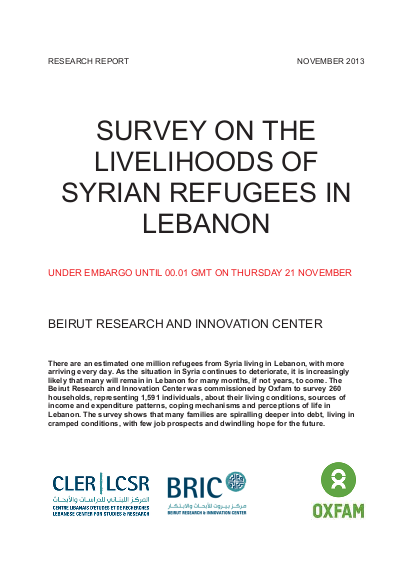
The survey commissioned by Oxfam was meant to provide an indicative tool to assess the situation of Syrian refugees in Lebanon and to document key questions related to existing coping mechanisms, social and economic conditions and respondents’ fears and aspirations regarding the future. The survey centred on very specific questions; however, to answer these questions, BRIC had to develop a framework for a comprehensive understanding of the overall conditions for the refugees to better assess and represent the voices of the refugees with regards to the specific questions at hand. To this end, the report covers far more ground than scope of the survey initially requested.
To provide a comprehensive understanding of the situation of Syrian refugees, BRIC scoped the following areas related to the lives of the target group:
- Demographics: documenting the main demographic aspects of the population and comparing them with existing data on the Syrian population at large to assess where the refugees are coming from and what social constraints surround their presence in Lebanon.
- Economic conditions: assessing the economic constraints related to income and expenditure, work, skills, levels of financial assistance received, and coping mechanisms. Through the comprehensive survey, it will also be possible to assess the refugee community’s economic impact on the Lebanese economy.
- Social conditions: examining available social services in relation to actual needs, as well as living conditions in light of social constraints.
- Future prospects: putting the above mentioned conditions into perspective and following special lines of inquiry to draw out a more accurate and realistic assessment of refugees’ hopes, fears and constraints. Additionally, a glimpse at social cohesion among Syrians and between Syrian refugees and their host communities will be analyzed.
The study also aims to understand the perception of the Lebanese officials most concerned with dealing with the refugee crisis on a national and local level. It examines their perception of the problem alongside that of the refugees themselves and to tries to develop a comparative framework for bridging the gaps in perception in the future.
Resource collections
- Topics
- UN Habitat - Urban Response Collection
- Urban Response - Urban Crisis Preparedness and Risk Reduction
- Urban Response Collection - Community Engagement and Social Cohesion
- Urban Response Collection - Economic Recovery
- Urban Response Collection - Environment and Climate Change
- Urban Response Collection - Housing, Land and Property
- Urban Response Collection - Urban Crisis Response, Recovery and Reconstruction
- Urban Response Collection - Urban Resilience
